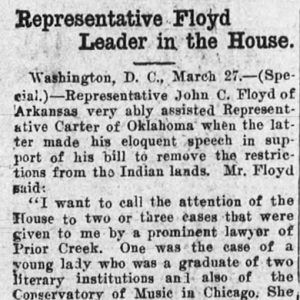calsfoundation@cals.org
John Charles Floyd (1858–1930)
John Charles Floyd was a Democratic member of the U.S. House of Representatives. He represented the Third District of Arkansas in the Fifty-Ninth through the Sixty-Third Congresses, serving from 1905 to 1915.
John Charles Floyd was born on April 14, 1858, in Sparta, Tennessee, to John Wesley Floyd and Eliza Jane Snodgrass Floyd. Floyd spent his early years in Tennessee while his father served in the Confederate army. After the Civil War, the family moved to Arkansas, settling near Bentonville (Benton County) in 1869. There, Floyd received his early education, attending the local common school and the high school. He continued his education at Arkansas Industrial University in Fayetteville (Washington County), which later became the University of Arkansas, from which he graduated in 1879. He began working as a school teacher in Springdale (Washington and Benton counties) in 1880. At the same time that he was teaching, Floyd pursued the study of law, and after spending much of 1882 reading law with a Bentonville attorney, he was admitted to the bar in the latter part of that year.
Leaving teaching behind for good, he moved to Yellville (Marion County) and set up a law practice. Prior to his move, Floyd had served briefly as the county examiner for Benton County, and shortly after arriving in Yellville, he was appointed to that same post for Marion County. He would fill that role for the next six years. In addition, Floyd established his own private practice, initially establishing a partnership with his brother, but ultimately pursuing a solo practice.
Floyd married Virginia Berry on November 20, 1887, and they had three children.
Floyd then entered the political arena, winning election to the Arkansas House of Representatives, where he served from 1889 to 1891. He was next elected to the position of prosecuting attorney for Arkansas’s fourteenth judicial circuit, a post he filled from 1890 until 1894.
Although he was unsuccessful in his first bid for a House seat in 1902, he secured the Democratic Party nomination in 1904 and this time won a seat in the U.S. House of Representatives with just over fifty-six percent of the vote.
In Congress, Floyd’s primary committee work took place on the Judiciary Committee. There, he was a member of a subcommittee that drafted the Clayton Anti-Trust Act. He was also a manager of the successful impeachment proceedings against Commerce Court Judge Robert Archbald, who was later convicted by the Senate. Floyd also served on the Labor Committee, the Militia Committee, and the Committee on War Claims, as well as the Committee on Accounts, the Committee on Expenditures for Agriculture, the Education Committee, and the Levees and Improvements of the Mississippi River Committee.
After a decade of service and a string of solid reelection victories, Floyd chose not to seek reelection in 1914, deciding instead to return to Yellville upon the end of his term in March 1915. Floyd returned to practicing law. At the same time, he also prospered as a farmer. He did make one final foray into the political arena, unsuccessfully seeking the governorship in 1920.
Floyd was living in Yellville when he died on November 4, 1930. He is interred at Layton Cemetery in Yellville.
For additional information:
Berry, Earl. History of Marion County. Little Rock: International Graphics Industry, 1977.
Herndon, Dallas Tabor. Centennial History of Arkansas. Vol. 3. Chicago: S. J. Clarke Publishing Company, 1922.
“John Charles Floyd.” Biographical Directory of the United States Congress. http://bioguide.congress.gov/scripts/biodisplay.pl?index=F000222 (accessed October 30, 2025).
William H. Pruden III
Ravenscroft School





Comments
No comments on this entry yet.